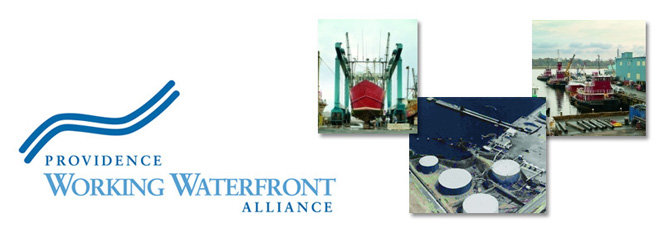Today’s Providence Journal has a very strong editorial arguing for maintaining and investing in Providence’s Allens Ave working waterfront:
Last month, Patrick Conley threw in the towel on plans to develop a hotel/condo/marina project on Allens Avenue, and that is good news. The people of Rhode Island need Providence’s waterfront for other things than hotels and deluxe condos. Our leaders should be pushing for the full development of all of the state’s ports, encouraging marine-based industry, trade and the creation of high-paying jobs.
The temptation to cash in on waterfront real estate for quick property-tax bucks is hard for cities to resist, but there are far-thinking leaders around the country who recognize how important ports are to their constituents’ economic prospects. New York Mayor Michael Bloomberg, for example, recently reversed course on turning the Brooklyn piers into high-priced residential real estate. He also supported the construction of a multi-billion dollar freight tunnel under New York Harbor to ease congestion on the city’s stressed rail infrastructure. Virginia and South Carolina, meanwhile, are moving aggressively to reap money and jobs when the economy turns around and bigger ships start moving through the widened Panama Canal to the East Coast.
Rhode Island has precious little industrial-zoned waterfront left. Condos in theory might turn a profit for developers there, as along the East Providence waterfront, where much of the region’s heating oil is brought in. But, as Mr. Conley was perhaps forced to conclude, the market cannot support much more fancy condo development for the foreseeable future. It is becoming ever clearer that a key to strengthening Rhode Island’s economy lies in developing the ports.
Mr. Conley’s sobering realization may have yet to penetrate City Hall, where he hopes to find a buyer of his five-acre property. Mayor Cicilline is still promoting a mixed-use commercial and residential zoning scheme around Conley’s property. This makes little sense, given the vital need to revive Rhode Island’s economy and protect the high-paying jobs along Allens Avenue. Moreover, the state’s taxpayers (who help prop up Providence through state aid) should not be expected to back ventures into iffy real-estate deals or obtaining property by eminent domain at the cost of good jobs and state tax revenue.
Providence, like New York, should be nurturing its working waterfront, recognizing that blue-collar jobs are precious commodities in today’s economy.

